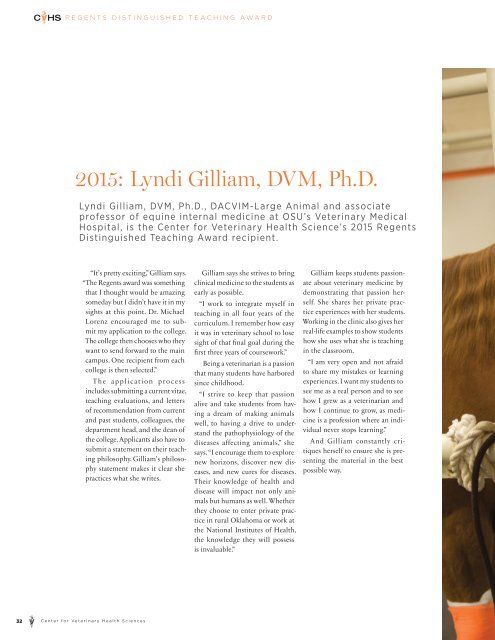Vet Cetera magazine 2015
Official magazine of the Center for Veterinary Health Sciences at Oklahoma State University
Official magazine of the Center for Veterinary Health Sciences at Oklahoma State University
You also want an ePaper? Increase the reach of your titles
YUMPU automatically turns print PDFs into web optimized ePapers that Google loves.
REGENTS DISTINGUISHED TEACHING AWARD<br />
<strong>2015</strong>: Lyndi Gilliam, DVM, Ph.D.<br />
Lyndi Gilliam, DVM, Ph.D., DACVIM-Large Animal and associate<br />
professor of equine internal medicine at OSU’s <strong>Vet</strong>erinary Medical<br />
Hospital, is the Center for <strong>Vet</strong>erinary Health Science’s <strong>2015</strong> Regents<br />
Distinguished Teaching Award recipient.<br />
“It’s pretty exciting,” Gilliam says.<br />
“The Regents award was something<br />
that I thought would be amazing<br />
someday but I didn’t have it in my<br />
sights at this point. Dr. Michael<br />
Lorenz encouraged me to submit<br />
my application to the college.<br />
The college then chooses who they<br />
want to send forward to the main<br />
campus. One recipient from each<br />
college is then selected.”<br />
The application process<br />
includes submitting a current vitae,<br />
teaching evaluations, and letters<br />
of recommendation from current<br />
and past students, colleagues, the<br />
department head, and the dean of<br />
the college. Applicants also have to<br />
submit a statement on their teaching<br />
philosophy. Gilliam’s philosophy<br />
statement makes it clear she<br />
practices what she writes.<br />
Gilliam says she strives to bring<br />
clinical medicine to the students as<br />
early as possible.<br />
“I work to integrate myself in<br />
teaching in all four years of the<br />
curriculum. I remember how easy<br />
it was in veterinary school to lose<br />
sight of that final goal during the<br />
first three years of coursework.”<br />
Being a veterinarian is a passion<br />
that many students have harbored<br />
since childhood.<br />
“I strive to keep that passion<br />
alive and take students from having<br />
a dream of making animals<br />
well, to having a drive to understand<br />
the pathophysiology of the<br />
diseases affecting animals,” she<br />
says. “I encourage them to explore<br />
new horizons, discover new diseases,<br />
and new cures for diseases.<br />
Their knowledge of health and<br />
disease will impact not only animals<br />
but humans as well. Whether<br />
they choose to enter private practice<br />
in rural Oklahoma or work at<br />
the National Institutes of Health,<br />
the knowledge they will possess<br />
is invaluable.”<br />
Gilliam keeps students passionate<br />
about veterinary medicine by<br />
demonstrating that passion herself.<br />
She shares her private practice<br />
experiences with her students.<br />
Working in the clinic also gives her<br />
real-life examples to show students<br />
how she uses what she is teaching<br />
in the classroom.<br />
“I am very open and not afraid<br />
to share my mistakes or learning<br />
experiences. I want my students to<br />
see me as a real person and to see<br />
how I grew as a veterinarian and<br />
how I continue to grow, as medicine<br />
is a profession where an individual<br />
never stops learning.”<br />
And Gilliam constantly critiques<br />
herself to ensure she is presenting<br />
the material in the best<br />
possible way.<br />
32 Center for <strong>Vet</strong>erinary Health Sciences


